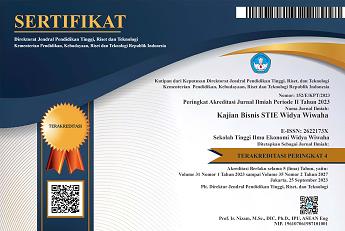NORMA SUBYEKTIF DAN SELF-EFFICACY DALAM PENERIMAAN APLIKASI REKSA DANA DAN SAHAM
DOI:
https://doi.org/10.32477/jkb.v32i2.966Keywords:
Mutual Funds, Share, Subjective Norms, Self-EfficacyAbstract
Mutual funds and shares are investment elements that are more volatile compared to gold, but in the long term they are quite profitable elements. This can be seen during the COVID-19 pandemic, the Russian-Ukrainian war crisis, and the bankruptcy of a large bank in America, this investment element still provides profits. The financial technology industry also provides various service applications on mobile phones or smartphones that make it easier for people to invest in mutual funds and shares. This research analyzes the determinants of Indonesian society's acceptance of stock mutual fund applications using the Technology Acceptance Model (TAM) and adding two external variables, namely subjective norms and self-efficacy. This research uses Structural Equation Model-Partial Least Square (SEM-PLS) to test the hypothesis. The results show that all TAM variables and subjective norms have an influence, but self-efficacy does not influence interest in using mutual fund and stock applications. In order to increase public acceptance of mutual fund and stock investment applications, and then interest in using them, service providers should improve the ease of operation and usefulness of their applications. Efforts should also be made to encourage people to recommend each other to invest through this application.
Downloads
References
Alsaffar, R. D., Alfayly, A. and Ali, N. (2022) ‘Extended Technology Acceptance Model for Multimedia-Based Learning in Higher Education’, 12(12), pp. 1300–1310. doi: 10.18178/ijiet.2022.12.12.1754.
Bonn, M. A. et al. (2015) ‘Purchasing Wine Online: The Effects of Social Influence, Perceived Usefulness, Perceived Ease of Use, and Wine Involvement Purchasing Wine Online: The Effects of Social Influence, Perceived Usefulness, Perceived Ease’, Journal of Hospitality Marketing and Management, 8623. doi: 10.1080/19368623.2016.1115382.
Bursa Efek Indonesia (2011a) Surat Keputusan Direksi PT Bursa Efek Indonesia Nomor: Kep-00005/BEI/01-2011 Tentang Perubahan Keputusan Direksi PT Bursa Efek Indonesia Nomor: Kep-00400/BEI/12-2010 perihal Perubahan Peraturan Nomor II-A Tentang Perdagangan Efek Bersifat Ekuitas. Indonesia.
Bursa Efek Indonesia (2011b) Surat Keputusan Direksi PT Bursa Efek Indonesia Nomor: Kep-00086/BEI/10-2011 Tentang Peraturan Nomor III-G tentang Suspensi dan Pencabutan Persetujuan Keanggotaan Bursa. Indonesia.
Bursa Efek Indonesia (2020) Surat Keputusan Direksi PT Bursa Efek Indonesia Nomor: Kep-00109/BEI/12-2020 Tentang Pedoman Perdagangan PT Bursa Efek Indonesia. Indonesia.
Chen, L. and Aklikokou, A. K. (2019) ‘Determinants of E-government Adoption: Testing the Mediating Effects of Perceived Usefulness and Perceived Ease of Use’, International Journal of Public Administration, pp. 1–16. doi: 10.1080/01900692.2019.1660989.
Chong, L. L., Ong, H. B. and Tan, S. H. (2021) ‘Acceptability of mobile stock trading application: A study of young investors in Malaysia’, Technology in Society, 64. doi: 10.1016/j.techsoc.2020.101497.
Gunawan, W. (2023) ‘Ekonomi dan Pasar Modal Analisa Kuartal Keempat 2023 dan Prospek Kuartal Pertama 2024’, Mandiri Investasi, pp. 1–4.
Kasemharuethaisuk, H. and Samanchuen, T. (2023) ‘Factors Influencing Behavior Intention in Digital Investment Services of Mutual Fund Distributors Adoption in Thailand’.
Khan, M. J. et al. (2023) ‘Challenges of E-Learning: Behavioral Intention of Academicians to Use E-Learning during COVID-19 Crisis’, J. Pers. Med, 13(555), pp. 1–16. Available at: https://doi.org/10.3390/jpm13030555.
Khan, S. A. et al. (2020) ‘Behavioral Intention to Use Online Learning During COVID-19: An Analysis of the Technology Acceptance Model’, (December).
Kumar, J. A. et al. (2020) ‘Behavioral intention to use mobile learning: Evaluating the role of self-efficacy, subjective norm, and whatsapp use habit’, IEEE Access, 8, pp. 208058–208074. doi: 10.1109/ACCESS.2020.3037925.
Lew, S. et al. (2020) ‘The disruptive mobile wallet in the hospitality industry: An extended mobile technology acceptance model’, Technology in Society, 63, p. 101430. doi: 10.1016/j.techsoc.2020.101430.
Otoritas Jasa Keuangan (2021) Strategi Nasional Literasi Keuangan Indonesia (SNLKI) 2021 - 2025. Indonesia.
Primastiwi, A., Kurniawan, T. A. and Milanda, D. P. (2023) ‘Subjective Norm and Religiosity in Public Acceptance Towards Digital Money Usage with TAM Model’, AIP Conference Proceedings, 2714(May 2021). doi: 10.1063/5.0129332.
Ramadania, S. and Braridwan, Z. (2019) ‘The Influence of Perceived Usefulness, Ease of Use, Attitude, Self-Efficacy, and Subjective Norms Toward Intention to Use Online Shopping’, International Business and Accounting Research Journal, 3(1), pp. 1–14. Available at: http://dx.doi.org/10.15294/ibarj.v3i1.
Rodani, A. (2023) Dampak Kolapsnya Silicon Valley terhadap Industri Perbankan Indonesia. Available at: https://www.djkn.kemenkeu.go.id/kanwil-kalbar/baca-artikel/15975/Dampak-Kolapsnya-Silicon-Valley-Bank-terhadap-Industri-Perbankan-Indonesia.html (Accessed: 16 August 2023).
Singh, S. and Srivastava, R. K. (2020) ‘Understanding the intention to use mobile banking by existing online banking customers: an empirical study’, Journal of Financial Services Marketing, 25(3–4), pp. 86–96. doi: 10.1057/s41264-020-00074-w.
Widiyanti, N., Susanti, F. E. and Nugroho, J. P. (2023) ‘Analisis Konsep Rentang Harga Perdagangan Saham Optimum Pada Perusahaan Bursa Efek Indonesia Tahun 2020’, Jurnal Minfo Polgan, 12, pp. 442–452. Available at: https://doi.org/10.33395/jmp.v12i2.12428%0Ae-ISSN.
Downloads
Published
Issue
Section
License
Copyright (c) 2024 Anita Primastiwi, Taufan Adi Kurniawan, Devina Andriany

This work is licensed under a Creative Commons Attribution-ShareAlike 4.0 International License.









